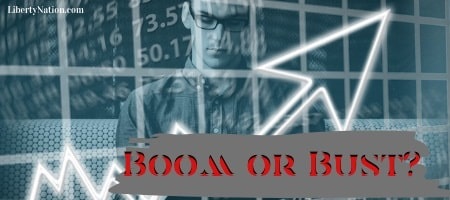Is the global economy about to catch a cold that will require Tylenol and cough medicine? Or will the international marketplace fall victim to an epidemic that will necessitate an extended hospital stay and paralyze commerce? As the Wuhan coronavirus outbreak intensifies and extends beyond the borders of China, panic is beginning to spread, and we see the disarray unfold in global financial markets. Everyone is aware of the human costs of these events, but there are plenty of economic costs, too, which were evident in the first trading session of the week when everything showed symptoms of the flu.
Made in China
China has been in freefall for the last couple of years as the trade war with the United States has impacted an already fragile economy. Beijing has been showing signs of resuscitation in recent months with retail sales, industrial output, and exports beginning to rebound amid the winding down of the trade spat. These improvements might be short-lived as China sees red across the board – at least in the near-term.
 At the time of this writing, the coronavirus has killed more than 100 people and infected 4,500. The nation has already quarantined millions, imposed travel restrictions, and extended the Lunar New Year holiday into February so officials can expand their prevention and control measures.
At the time of this writing, the coronavirus has killed more than 100 people and infected 4,500. The nation has already quarantined millions, imposed travel restrictions, and extended the Lunar New Year holiday into February so officials can expand their prevention and control measures.
It is not surprising that the Nikkei and the Shanghai Composite have posted triple-digit losses. Asian airlines, such as South Korea’s Korean Air Lines and Singapore’s Singapore Airlines, have recorded steep declines. The Chinese yuan has plummeted to a 2020 low, reversing its momentum at the start of the year.
Uncertainty may continue to affect the Chinese economy over the next several weeks and perhaps into spring. While this situation is not nearly as deadly as the SARS outbreak, many red flags are being hoisted to heighten fear: The coronavirus is spreading, the World Health Organization (WHO) raised the risk level from “moderate” to “high,” and experts note that the Communist government is not doing any good by being so clandestine. When you factor in mainstream media reporting on bat soup delicacies and escalating the paranoia, you get a lot of misinformation that inevitably seeps into equities.
It was only a matter of time before the hysteria affected the U.S. economy, too.
Sniffles in America
The Dow Jones Industrial Average officially turned negative after posting its worst day since October. Stocks that have exposure to China have been hammered. The Marriott and Hyatt Hotels have slipped 6%. Yum China, Starbucks, and McDonald’s have shut down stores as a precautionary measure. Some U.S. airlines have weakened. Even Anheuser-Busch InBev has fallen 7% over the last month because it has a brewing facility in Wuhan and perhaps because one of its chief products shares a name with the virus: Corona; Google searches for the beer have soared in recent days.

(Photo By Carlos Avila Gonzalez/The San Francisco Chronicle via Getty Images)
The ocean of red ink drowning the New York Stock Exchange will most likely be brief. For instance, during the SARS fright, the U.S. stock market crashed as much as 15%, but it pared all those losses within just a few months. The American economy expanded at a 3.5% and 7% clip in the aftermath.
Overall, Moody’s Analytics estimates not too much damage. It anticipates that the coronavirus will trim 0.1% off the U.S. economy in the first quarter, which is not much for a gross domestic product (GDP) that expands about 2%. In other words, don’t hit the sell button just yet.
SARS Versus Corona
Many scaremongers in the mainstream press liken the coronavirus to the SARS crisis of 17 years ago. But while this will generate cheap clicks and force a chunk of the population to purchase face masks and biohazard suits, it is dishonest. For one thing, the mortality rate of SARS was far higher than what is presently believed about the coronavirus. The second thing is that business conditions have evolved.
The Chinese economy and the global market have dramatically transformed in the last two decades. An example would be how consumers shop. In 2003, e-commerce was still in its infancy stage, and shoppers continued to do most of their purchasing at the local brick-and-mortar outlet. If people are staying home, they will make a few clicks and order what they need.
Another important factor for China is that production facilities had already scheduled interruptions to their output because of the Chinese New Year. With the government extending the holiday until Feb. 2, companies will search for ways to recoup their losses and limit the short-term impact on their bottom line later in the year.
The market highlighted how airlines, hotels, and travel companies saw their valuations crumble. However, vacations that have been canceled will most likely be rescheduled for another time since a lot of travelers maintain a holiday travel budget. That family itching to see the Great Wall of China will postpone it a few months.
Finally, the People’s Bank of China (PBoC) has been willing to accommodate the growth in the world’s second-largest economy before. There is no reason to believe the PBoC and its counterparts will refuse to ramp up the printing presses, cut interest rates, and introduce other monetary policy tools – if the coronavirus lingers and eats away at growth prospects.
President Xi Jinping is probably thanking the heavens for getting phase one of the U.S.-China trade deal signed.
Here’s a Corona
 It has been said for a long time that if the United States sneezes, the rest of the world catches a cold. The same thing can be said of China now. When SARS was a serious health scare, the Chinese economy was still making its way to earning the title of heavyweight champion of the global economy. Any blows were less severe to international markets. Today, even a slight hiccup will induce all the symptoms of influenza on the world stage. That said, while the coronavirus should be taken seriously and everyone should take the necessary precautions, a lot of the hysteria is media-manufactured.
It has been said for a long time that if the United States sneezes, the rest of the world catches a cold. The same thing can be said of China now. When SARS was a serious health scare, the Chinese economy was still making its way to earning the title of heavyweight champion of the global economy. Any blows were less severe to international markets. Today, even a slight hiccup will induce all the symptoms of influenza on the world stage. That said, while the coronavirus should be taken seriously and everyone should take the necessary precautions, a lot of the hysteria is media-manufactured.
If you are worried about your health, you are more likely to die from the flu. If you are concerned about the Chinese economy, it is better to be worried about its astronomical levels of debt. If you are frightened about your 401(k), you should be paying attention to the Federal Reserve. In the end, sit back, have a Corona, and take a deep breath – we will pull through this. Just wash your hands!
~
Read more from Andrew Moran.




